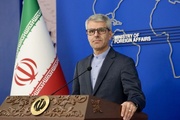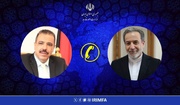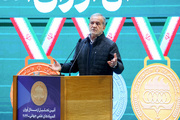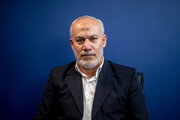Gary Sick, former member of the US National Security Council and under-secretary of state, called the recent rearrangement in Saudi Arabia’s kingdom a “dynasty coup” indicating that King
Salman and his son are more concerned with dynastic succession than they
are with competent and wise governance.
Part-time tutor on the Middle East in the Oxford University Department of Continuing Education, reaffirmed that Saudi kingdom is approaching failure despite the rearrangement due to its medieval nature of succession system, irrepressible Arab Spring, financial problems, democratic feelings of Saudi young generation and stupidity of the regime.
Gary Sick put his interpretation of Saudi Arabia's latest developments in this way:
I make absolutely no pretense to being an expert on Saudi Arabia, and I am fully aware of the injunction that "those who talk don't know" what
is really going on inside the royal family. But we now have a considerable amount of data about the "new" Saudi Arabia and how it functions. As a rank outsider, let me posit a theory and ask our true experts to respond:
First, we know that Salman was for more than 15 years the head of the family council (Majlis al Uthra), that was established by King Fahd in 2000 to solve family matters. As such he was privy to the personal behavior of everyone in the family and was noted as the "enforcer," to insure proper royal behavior. Put another way, this was a man who was intimately familiar with the family and its unique rules of operation, and he knew where all the bodies were buried. Perhaps more than anyone else in the Kingdom, he understood how to manage and manipulate the royal family. I suspect that Salman has been grievously underestimated. Instead of seeing him as a fading elder who was a bit batty according to some accounts, what if he was really the canniest of the lot — the individual who not only knew what he wanted but understood in granular detail exactly how to get there. Let us posit that Salman understood that one of the biggest challenges that the Kingdom faced was how to make the transition to the new generation. He had a plan to make that happen. He would wait for his moment to become king, then strike quickly to elevate his son to the center of power. This he did within the first hours after becoming king. But he could not simply dismiss Prince Mohammed bin Nayef without angering the family, so he installed him as crown prince. But then he systematically set about removing any real power from Nayef's hands; he was also aware that Nayef's physical condition inhibited him from launching a counter-attack. After two years, Salman simply dismissed him and gave all his powers to his own sons. As a sop, he promised that any future king (following his own son) would have to come from another branch of the family. But of course that decree could be rescinded, just as the previous rules had been. The next step in this carefully orchestrated process will probably be the abdication of the king and the elevation of his favorite son to the kingship, thus completing the generational transition and the likelihood that his own branch of the family will control the fate of the most influential Arab state in the Gulf for the foreseeable future.
This is not an original interpretation of Saudi royal politics. It is simply a description of what has happened in the past two years and where logic would suggest it is going. In my view, this was nothing less than a dynastic coup, carried out with ultimate finesse by someone who
truly understood the levers of power in the Kingdom.
It is also a gamble that the young prince is up to the job. The entire future of the [Persian] Gulf depends on it. The evidence so far suggests that Salman and his son are more concerned with dynastic succession than they are with competent and wise governance. We are likely to have plenty of
time to reconsider and refine that judgment over the Salman era.
And this is how Farhang Jahnpour responded to Sick:
In reference to Gary’s very thoughtful and well-informed comments about King Salman the Magnificent’s alleged astuteness in preparing the transition from one generation to the next, I should state that I have much less expertise on Saudi Arabia than he has. However, I believe that Salman’s clever tactics to promote his own children at the expense of other members of the family will fail due to a number of reasons.
First, the whole system of succession in Saudi Arabia is medieval and completely out of step with modern democratic principles, even in an autocratic society such as Saudi Arabia. Rearranging the deckchairs will fail to stem the massive tide of events that is rocking the flimsy regime from all sides.
Secondly, the so-called Arab Spring might have been suppressed in the Persian Gulf littoral states for the time being as the result of the use of massive force, but it is impossible to put that genie back in the bottle. In fact, the desperate attempts of Saudi rulers in sending forces to Bahrain to crush the uprising, their barbaric bombardment of Yemen, their support for militant groups to create chaos throughout the Middle East, and their latest extravagant deals with the United States are all signs of fear and panic, of weakness and desperation, and not of strength.
Thirdly, the unwritten convention between Saudi rulers and their subjects has been that they would take care of the material needs of the public and would not charge any taxes in return for their loyalty. It is no longer possible to fulfill that bargain due to the financial problems with which the kingdom is grappling, which are bound to intensify. The time for huge revenues and generous subsidies to 15,000 “princes” and social welfare for the rest of the society is over. Already, 30% of Saudi youth are unemployed, thousands of foreign workers have been dismissed and expelled, in some cases without paying them their arrears, and many firms have already gone bankrupt.
An autocratic regime will not be able to win the support of its disenfranchised subjects in the face of major social hardships. This situation becomes more untenable when people see the extravagant lifestyle of their new crown prince and their future monarch who, while holidaying in the South of France sees a super-yacht, fancies it and buys it on the spot for 500 million euros, more than three times its original price, when the majority of Saudis are grappling with austerity.
Fourthly, there are already some stirrings of democratic feelings among young Saudis. A number of states in the Middle East, such as Turkey, Iran and Israel, and even some post-uprising states such as Tunisia, are not perfect democracies, but when the Saudis and other people in the Persian Gulf littoral states see how enthusiastically people take part in the elections and choose their leaders in those countries, they may not be satisfied with their monarch appointing by decree his inexperienced and over-ambitious young son as their next leader
Finally, I think the factor that more than anything else will result in the collapse of the Saudi regime, is hubris and stupidity. Saudi rulers have put all their eggs and hundreds of billions of dollars in President Trump’s bottomless basket. His hasty and inauspicious embrace of Saudi dictators has emboldened them to think that they can get away with murder. Otherwise, why in the middle of all the problems that the regime is facing, should it start the vicious campaign against another PGCC member, which incidentally houses America’s biggest base in the region and whose gas is indispensable to both Europe and to many Asian countries. That stupid gamble has already failed, has pushed Qatar closer to Iran and Turkey, and may actually result in the collapse of the PGCC. With their open campaign against free speech by demanding Qatar close down Aljazeera, with their unlawful demand that Qatar cuts off her diplomatic relations with another major regional power, and even revealing their pettiness by expelling thousands of Qatari camels presumably thinking that they were acting as spies, the Saudi regime is paving the way for its own downfall.
Gary Sick is a former member of the US National Security Council and under-secretary of state. He has written many good books and articles on Iran. He also runs what he calls Gulf200 or G2K web site which attracts thousands of American and world experts on the Middle East, especially former diplomats and government officials.
Farhang Jahanpour has been teaching at Oxford for the past 33 years, and his current title is "part-time tutor on the Middle East in the Department of Continuing Education and a member of Kellogg College at the University of Oxford."





















Your Comment